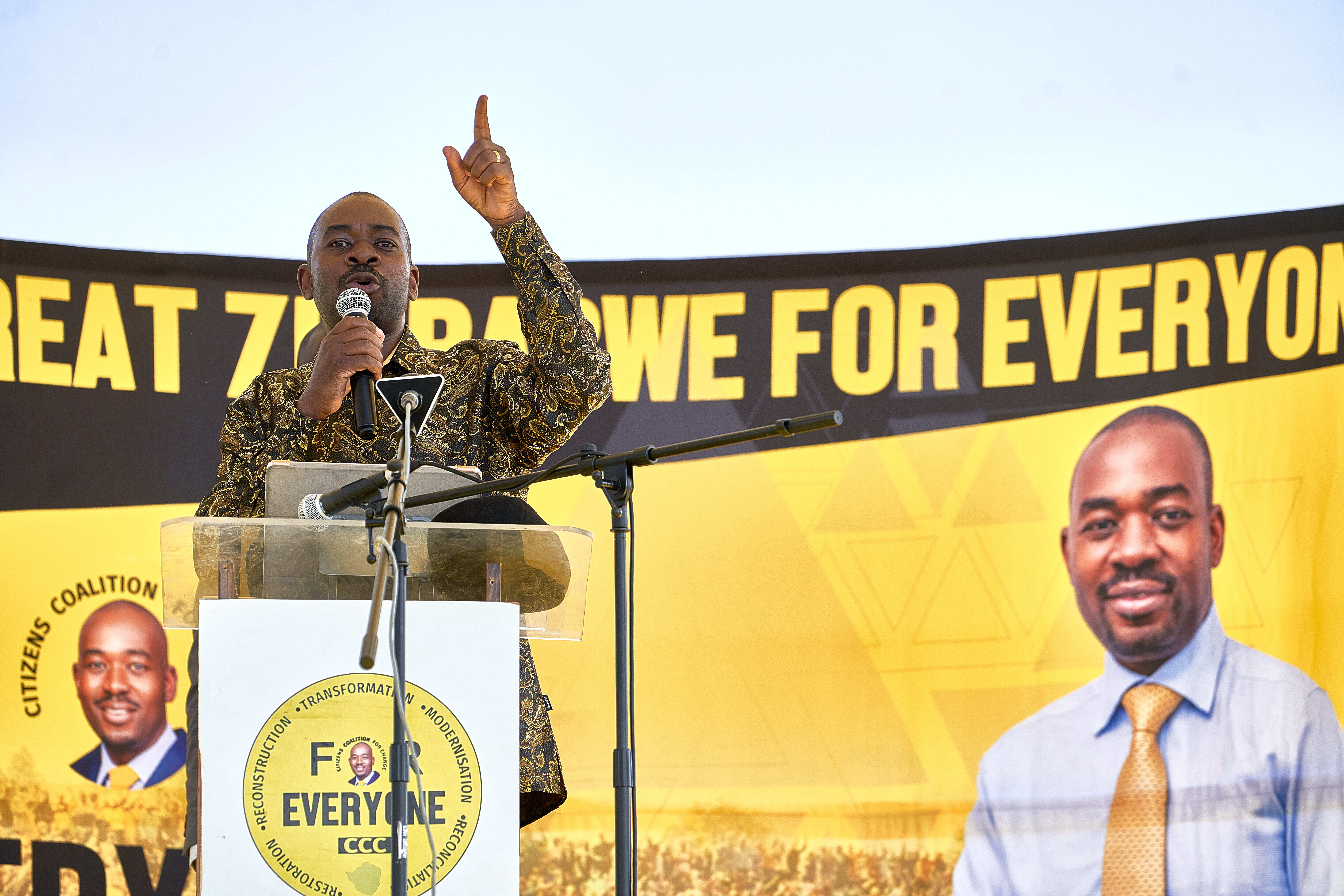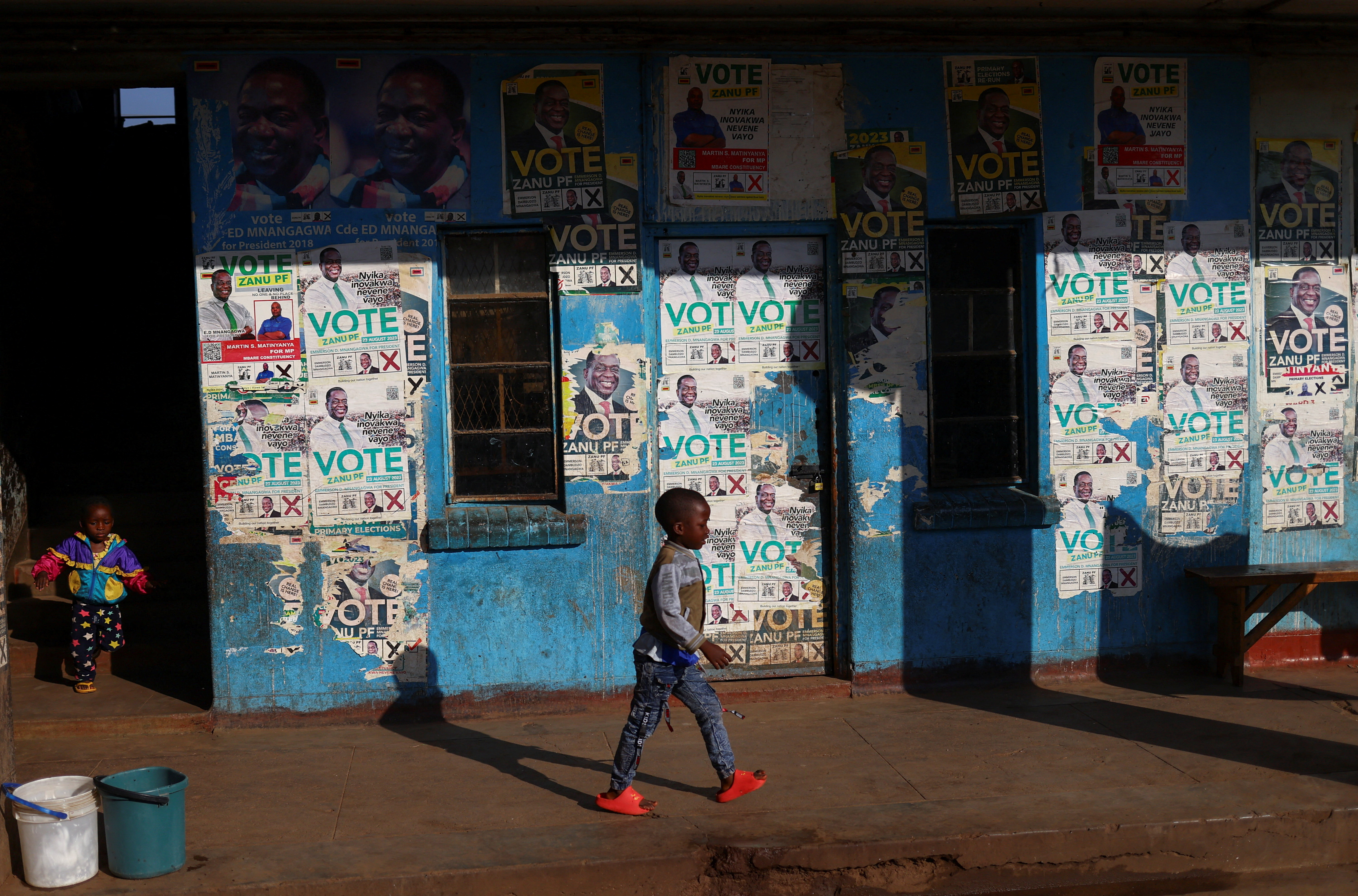
Harare, Zimbabwe – Mufaro Boroma became eligible to vote under Zimbabwean law two years ago, but she will not be voting in her country’s general elections on Wednesday.
“I didn’t register to vote because I didn’t think my vote would change the outcome of the election,” the 20-year-old beauty therapist from Harare told Al Jazeera. “Why should I waste my time? It’s clear ED [president Emmerson Dambudzo Mnangagwa] and ZANU-PF [the ruling party] are going to win.”
She is one of a number of Zimbabweans boycotting this month’s presidential election, believing it to be a foregone conclusion in favour of the ruling party.
“It’s like watching a delayed soccer match whose outcome you know already,” Chipo Zisengwe, a 42-year-old, told Al Jazeera in Harare.
Since Zimbabwe’s independence from Britain in 1980, only two men have led the country, both from the Zimbabwe African National Union (ZANU-PF), the liberation movement that morphed into a centre-left political party. It has long been accused of rigging elections using state institutions to maintain its stay in power, but ZANU-PF denies this and insists it is popular with the electorate.

‘Goliath will be slain’
Still, many remain sceptical of the electoral process.
According to a July 2023 study by Afrobarometer, only half of the country has confidence in the ability of the Zimbabwe Electoral Commission to conduct credible elections. In the build-up to Wednesday’s elections, users on the social media platform X offered barbecue to incentivise people who are of age to vote, but hadn’t registered to do so.
Analysts say a low voter turnout could hurt the chances of Nelson Chamisa, the 45-year-old leader of the country’s main opposition, who has a largely youthful base.
His supporters say their frustration with the status quo stems from a floundering economy in which hyperinflation continues to decimate purchasing power. High unemployment means the majority of the population is engaged in some sort of informal work, including menial jobs like laundry services and digging fields, to survive.
This has stimulated a lot of interest in the campaign of Chamisa, leader of the Citizens Coalition for Change (CCC). The candidate has promised to help create 2.5 million jobs within five years if elected. Indeed, the election is seen as a referendum on Mnangagwa’s performance in office.
But the odds are stacked against Chamisa prevailing, analysts say.
He knows this, but remains confident that he can emerge victorious.
“I’m coming armed with a stone. Goliath will be slain with a stone,” he said, fashioning himself as the Biblical David, who defeated the giant Philistine warrior, Goliath, with a slingshot.
It’s a narrative the opposition leader has been painting for some time. “This giant Goliath looks so ‘big and invincible’, but is so weak and vulnerable. It’s just a matter of time,” he said in May 2021.
Going against the machinery of the state
In 2018, Mnangagwa secured 50.8 percent of the presidential vote, barely surpassing the required 50 percent plus one vote but edging his closest rival, Chamisa, then of the Movement for Democratic Change Alliance (MDC), who received 44.3 percent of the votes.
Chamisa and his supporters claimed the election was rigged, but the courts disagreed, upholding the president’s victory.
That result helped further ingrain a “lack of trust” in the democratic process, said Stanford Nyatsanza, a public policy researcher at Zimbabwe Democracy Institute (ZDI).
“The continued conduct of disputed elections without desired outcomes scares away voters from casting their votes in the next election,” he told Al Jazeera.
To make matters worse, Chamisa and smaller opposition parties have had to work with scarce resources.
Presidential tickets were set at $20,000 by the electoral commission, denting the budget of the opposition.
Only ZANU-PF and the MDC, now the second-largest opposition party, got funding from the government for the election season. By law, funding is distributed to political parties based on the percentage of votes they garnered in elections. The CCC, which wasn’t formed until four years after the 2018 elections, has been forced to find funding elsewhere.
At a rally on Monday, Chamisa told supporters that he would not let the ruling party “steal the election” again.
But a significant lack of resources could mean that the opposition does not have “enough monitors to expose likely rigging at every polling station”, which could be “the game changer,” said ZDI researcher Bekezela Gumbo.
These challenges make the task of unseating Mnangagwa a difficult one, said Eldred Masunungure, director of the Mass Public Opinion Institute and professor at the University of Zimbabwe.
“I really doubt if Chamisa will win based on empirical evidence. If ED wins, he will do so with a comfortable margin,” he told Al Jazeera.
Chamisa’s critics also point out that his party has no organisational structure or constitution and question his ability to lead a country in dire need of stability. Despite having a “magnetic appeal”, the perception is that he is a one-man squad, Masunungure said.
“He is charismatic and that counts enormously … the downside is that his personal qualities tend to displace the organisational qualities required to run a successful organisation,” he said.
By contrast, the ruling party has the machinery of the state behind it.
When the election campaigning season commenced, Zimbabwean police barred Chamisa’s rallies while Mnangagwa was unfettered in campaigning. On Tuesday, 40 CCC faithful were arrested for holding a “car procession rally”. It is unclear whether they have been released.
Opposition supporters have also been targeted for intimidation by a shadowy group, Forever Associates of Zimbabwe, linked to Zimbabwe’s state security agency, the Central Intelligence Organisation (CIO). Earlier this month, one person was killed and several others injured during an ambush of CCC supporters going to a rally in southwest Harare by those loyal to ZANU-PF.
The Zimbabwe Electoral Commission has also withheld an auditable copy of the voters’ roll from the CCC and refused to give a detailed breakdown of the register.
‘Shrinking the margin of loss’
In the last few weeks of the campaign, some of the restrictions have been removed, causing some analysts to posit that in a free and fair election, Chamisa will win against Mnangagwa.
According to a June survey by Elite Africa Research, out of 2,000 registered voters polled, 47.6 percent indicated their support for Chamisa in the presidential election, while 38.7 percent favoured President Mnangagwa. The same poll revealed that 47.7 percent of respondents were inclined to vote for Chamisa’s CCC party, whereas 39.6 percent leaned towards Mnangagwa’s ruling ZANU-PF party in the parliamentary elections.
“Independent opinion polls such as one done by Elite Africa … show that Chamisa indeed has a sling [support of the majority of registered voters]. His policy blueprint also shows that he indeed has a sling to destroy the myriad of challenges bedeviling Zimbabwe,” Gumbo told Al Jazeera.
Gumbo noted that Chamisa, like Mnangagwa, has been appealing to the Christian community, “one of the largest constituencies in Zimbabwe”. An overwhelming majority of the country – 95 percent – are Christians, and according to an Afrobarometer survey, Zimbabweans trust religious and traditional leaders.
Chamisa’s forays in rural Zimbabwe, traditional ZANU-PF strongholds, could help “in shrinking the margin of loss” and boosting his strong support in the city centres, analysts say.
Mnangagwa was seen as a hero after deposing his friend former President Robert Mugabe ahead of the 2018 election. But he has lost that goodwill, they say.
He “demonstrated that he is not able to resolve the problems faced by the electorate and has no plan to make things better as shown by his failure to even pen a manifesto,” Gumbo told Al Jazeera.







